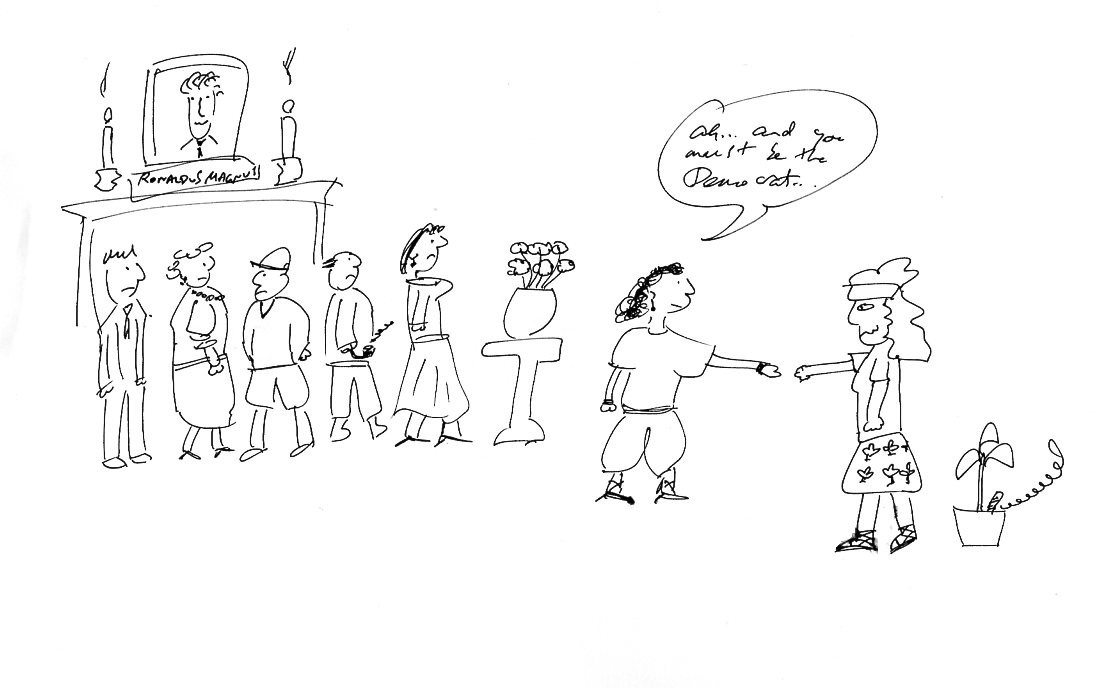I’ll add that French culture has a bit more purchase in Greece than in the Anglosphere. Intellectual Greeks know about Georges Brassens, for example: Ο Μπρασένς και το πλήθος . And Lucky Luke (pronounced in French via Greek, Looki Look) is almost as big as Asterix.
Month: August 2016
Was Newspeak inspired by Esperanto?
Yup.
You could argue (as both the English and Esperanto Wikipedias do) that the main inspiration for Newspeak was Basic English, which Orwell had been a fan of before rejecting. The minimal vocabulary premiss of Basic English (revisited in xkcd: Up Goer Five) is something Orwell derides in Newspeak.
But minimal vocabulary was also a selling point of Esperanto (though one that has been watered down in practice). And the morphology of Newspeak is pretty clearly an allusion of Esperanto and not Basic English. Behind doubleplusungood, you can see Orwell wincing about Esperantists’ praise for compounds like malbonega.
There is excellent circumstantial evidence behind this, which is recounted in the Esperanto Wikipedia article. (See also What is Esperanto? And why did it irritate George Orwell? and George Orwell et l’espéranto)
Orwell himself certainly knew about Esperanto. He went to Paris in 1927 to improve his command of French and to visit his aunt Kate Limouzin, who was the partner of the founder of SAT, Eugene Lanti. Esperanto was the main language used in the house, and for Lanti, as Orwell found out, Esperanto was not just a language but also an ideology. Lanti demonstrated to Orwell (if he hadn’t already realised it) the connection between politics and language. Orwell suffered, because he did not speak Esperanto.

Orwell in Burma, just before going to Paris. I gather those kinds of moustache were all the rage at the time.
And Eugène Lanti wasn’t just some random Esperantist.

Eŭgeno Lanti. Ne nur hazarda esperantisto.
His nom de plume L’anti “The anti-guy” was befitting a socialist opponent of Stalinism, who launched his own anti-nationalist ideology within Esperanto (Anationalism), and who ran the Sennacieca Asocio Tutmonda. SAT between the wars was the socialist alternative to the “bourgeois” Universal Esperanto Association, and its membership was huge.
Now. You’re 24 and Down and Out in Paris and London, crashing in your aunt’s place, and relying on her handouts. Your aunt is shacked up with a nutjob socialist who keeps preaching about Esperanto. You came to Paris to learn French, and all you hear the livelong day is Esperanto this and Esperanto that, and Esperanto proletarian victory this, and Esperanto against nationalism that—and all of it IN goddamn Esperanto.
Twenty years later, wouldn’t you want to take just a little revenge?
I was blocked by a user on Quora, but have not received any message from moderation. Can I assume that I did nothing against Quora policy?
No. Quora mods may take years to get to your message—they tend to be reactive and respond to reports, rather than proactive (unless a bot gets you), and they aren’t always quick.
The user may block you because they think you’ve broken a policy (in which case they would also report you). Or they may block you because they don’t like what you’ve said, even if you haven’t broken a policy. Or they may block you because they are oversensitive nincompoops (which of course applies to anyone who has ever blocked me).
Still, check what you did say in the exchange to trigger that response; and if you can see how they might reasonably take offence, avoid doing it. If someone’s answer is dumb, for example, the safest thing to do is post your own answer rather than comment. With the added bonus that it’s more visible.
How can one summarize the Watergate scandal to a kid?
Once upon a time, there was a president called Dick.
No, that really was his name.
Why are you laughing?
Dick was very clever, and worked very hard. But he was also very angry. He was very angry, because he was sad that people didn’t think he was cool. Like the other president, Jack. People thought he was cool.
Dick did not like people telling him what to do. He wanted to be in charge. Because he was angry and wanted to be in charge, he would hide things he was doing, even if he didn’t have to.
Because he was scared, he recorded every time anyone talked to him on tape. He was scared people would lie about what they talked about.
Because he was scared, and because people didn’t think he was cool, he was convinced that people were out to get him. And he wanted to get them before they’d get him.
When Dick would get angry, he would throw tantrums. He would yell a lot, and swear a lot, and demand that people should be fired and spied on and blown up.
Dick had a special friend called Bob. Bob liked Dick, and thought he was doing a good job. Bob passed on most of Dick’s messages to the other people that worked for Dick, so they could do things. Dick didn’t like talking to people.
But Bob also knew that Dick didn’t mean it when he’d yell and swear, and he’d try to make sure that people didn’t hear the things he didn’t mean.
But the tapes heard him.
Dick got some people who worked for him to spy on people he thought were bad. Or people that his other friend Henry thought were bad. Presidents aren’t allowed to do that. A judge has to work out if that’s legal, and if the people really are not just bad, but dangerous.
When the elections came, Dick put his friend John in charge of getting him to be president again. John took the things Dick said when he yelled more seriously than Bob did.
Some crazy people worked for John. There was this crazy guy called Gordon, and this crazy guy called Howard, and this other crazy guy called Jeb. And they had some crazy ideas on how to get Dick to be president again. But you’re too young to hear about them.
Most of the time, the people who worked for Dick kept control of these crazy people. John thought they were crazy too. But John wasn’t very good at keeping control of them, and John took Dick too seriously.
So someone got the idea that the crazy people should spy on the phone of Larry, the guy who was doing the same job as John, but for the other party. We don’t know who got the idea. It probably wasn’t Dick, because it was a silly idea. But Dick got people to spy before, so John thought it was OK.
It was not OK.
The crazy people got caught when they tried to break into Larry’s office, and the FBI tried to work out why they were trying to snoop on Larry.
When Dick found out that the crazy people got caught, he wanted to cover it up, because that would make him look bad. He yelled a lot at Bob.
The tapes didn’t hear him, because someone (maybe Dick) wiped out that bit of the tape.
Lots of people think crazy things about what was on the tape. But Bob kept a diary as well, and we don’t think that there was anything more than we already know now on the tape.
Then Dick told the FBI boss not to try to work out what the crazy people were doing, because they were from the CIA, and they were just trying to do good work for the government against the commies. That’s not OK, because the crazy guys weren’t doing anything about the commies, and even if they did, the president can’t tell the cops not to do their job. Especially when it’s just so he wouldn’t get in trouble.
Oh, the tapes heard that bit.
The crazy people kind of said they were working for the president, and the journalists started trying to work out what happen. The FBI boss’s deputy, Mr D. Throat, hated his boss, because he thought he was doing a bad job, not like the boss before him. So he started talking to the journalists in secret about what was going on. And the journalists worked out what was going on, and they got a movie made about them.
And between the judges and the journalists, people worked out that bad things were going on, and Dick was somehow mixed up with it. Many people already did not like a lot of things that Dick did, but many people still did. But this was serious, so Congress started investigating what had happened. If the president is involved, you can’t get a judge to decide: the president is supposed to be the boss of the judges, so its the Congress’ job to look at it.
Dick panicked, and he was very very very angry. He fired lots of people, like Bob and John, so people wouldn’t blame him.
But then, people found out about the tapes.
And then Dick panicked even more, and tried to make sure they wouldn’t hear the tapes, because they were his tapes, and there was secret stuff on them. But the big judges worked out, that even though the president is allowed to have secrets, he can’t have secrets about doing bad things.
Dick didn’t burn the tapes, though he thought about it. They were his tapes, and he wanted to keep them. But in the end, he handed the tapes over, because all the judges said he had to. And that was one law he couldn’t break.
And then people heard that he was trying to stop the FBI from doing their job. Even the people in Congress that liked Dick agreed that what he did was very bad. And they were about to fire Dick, because they get to do that when the president has been really bad.
So Dick quit before they could fire him. And Bob and John and the crazy people all went to jail.
The next president was a nice man called Gerry. Gerry liked chewing gum.
Gerry could have let Dick go to jail, but he decided not to. If he did, then people would respect the job of the president even less than they did already.
But ever since then, noone really respects the president’s job as much as they used to.
And that’s why your mummy and daddy are watching House of Cards.
And the lessons are:
- Just because you’re the president, you don’t get to do whatever you feel like. You can’t break the law.
- Even though Dick didn’t tell those crazy people to break the law, he had already told other people to break the law, and he was trying to stop the cops from doing their job. Dick was covering up the bad things other people did. That’s really bad as well, because part of the president’s job is to make sure people follow the law. And respect the law.
- Being president is not all about getting back at meanies. You have to think about what is going to be good for everybody. Even if it isn’t good for you. Being a president is a hard job.
- Make sure you don’t tape things that could be embarrassing to you later.
Sierra in Trumpland
Sierra Spaulding’s answer to Are the media guilty of inaccurately portraying Trump supporters as uneducated and poor? captures the close encounter between the Sandersnista Sierra Spaulding and her aunt’s Trump-supporting friends, in deepest darkest San Diego.
https://www.quora.com/Are-the-me…
Hm… yes, I think I have access to some footage of this happenstance:
Why do you love linguistics?
Here is an utterly left-field video I saw today, in the context of my day job (because my CTO is awesome). It’s knowledge management consultancy stuff, but I think it goes some of the way to explaining why I love linguistics:
- Complicated, in which the relationship between cause and effect requires analysis or some other form of investigation and/or the application of expert knowledge, the approach is to Sense – Analyze – Respond and we can apply good practice.
- Complex, in which the relationship between cause and effect can only be perceived in retrospect, but not in advance, the approach is to Probe – Sense – Respond and we can sense emergent practice.
Language, like most interesting human phenomena, is a Complex system:
- Things aren’t utterly random, as in Chaotic systems. It is possible to make sense of what is going on.
- Things aren’t just “one plus one equals two, why are you even asking me?”, as in Simple systems. You need expertise and discernment to make sense of what is going on.
- Of course, ill-informed laypeople think language is Simple. That’s the whole Mencken aphorism: “life is full of simple, easy to understand, wrong answers.”
- Because language is Complex, you’ll never solve everything, because the interplay is too complex. But you can keep poking away at it with a succession of hypotheses, and getting a better handle on it. And because it is Complex, you’re never going to run out of things to discover.
- Language is not Complicated, such that an Expert can come up with the complete solution. However, the hypotheses you come up with in the Complex slice are the business of experts, herding together and debating. And they’re fun, because they exercise your expertise. As long as you remember that they are, ultimately, just models.
So I love linguistics because it is a mental challenge (not Simple), and it is inexhaustible (not Complicated), yet it is still tractable (not Chaotic), and it is amenable to the scientific method (Complex).
Of course, that makes linguistics the same as the social sciences, which are Complex for the same reason: humans are involved, so a lot of causal factors are colliding at once. That doesn’t say why I love linguistics and not sociology. I guess that was simply because I was interested in language learning and linguistic patterns. But that’s what kept me interested.
Do you get why I loathe Chomsky now? His approach makes a point of discarding everything in language that makes it Complex. When you reduce language from a Complex to a Complicated system, you’ve reduced it to maths.
Maths is truly a beautiful thing. But language isn’t maths.
(Neither is neurology, which is what Chomsky thinks he’s doing.)
What are the precise meanings of the Greek words hyperēphanos and hyperphroneō?
Well, I’ve gone to LSJ. The definitions I find there are:
ὑπερφρονέω
- Group I
- to be over-proud, have high thoughts (Aeschylus)
- to be proud in or of something (Herodotus)
- overlook, look down upon, despise (Aeschylus)
- (passive) to be despised (Thucydides)
- think slightly of (Eurypides)
- Group II
- surpass in knowledge (Aeschines); excel in wisdom (Hippocrates)
ὑπερήφανος
- overweening, arrogant (Hesiod)
- bear oneself proudly; living sumptuously, prodigally or insolently, brutally
- magnificent, splendid (Plato)
- sublime (Damascius)
As you can see, hyperphroneō “above-think” can mean both “be more knowledgeable than” or “think that you’re above”; but from those definitions, that seems to have been about generic pride, rather than overestimating one’s abilities.
In the English language, why is remuneration pronounced renumeration?
People do mispronounce remuneration as renumeration all the time, contra some people’s denial of it here.
God knows I’ve done it, and I should know better.
Why do people do it? Because:
- The stems muner– and numer– are confusable through the oldest confusion in the historical linguistics book: Metathesis (linguistics).
- People are familiar with the numer– stem, from numerical.
- A mention of numerical in a word for how much money you get is entirely plausible, since you get an amount of money.
- People are unfamiliar with the muner– stem, for “gift”. It doesn’t show up anywhere else in English, the way numer– does.
- The stem is buried away in muni-ficent “gift-making”, without the –er-. Did you make the correlation?
How does Persian sound for non-Persian speakers?
I agree with Joachim Pense: the feature of Persian that has always stuck out for me is the back /ɑ/. That, in combination with the velars and palatoalveolars, make it sound… how do I come up with an impressionistic description? Passionate, actually. Kinda like German, which I love for its crunchiness, but with an extra /ɑ/, which makes it sound impassioned and earnest.
Did Greeks in the Ottoman age feel Greek or Roman? Why was Greek identity chosen and not Roman when fighting for independence?
Go to Names of the Greeks: much good information there.
On the eve of the Greek War of Independence, the prevalent term for Greeks was Roman (Romioi). That was what the simple folk used, and they used it to refer to Greek Orthodox Christians (the Rum Millet), as the folk of the East Roman (Byzantine) Empire.
The Westernising elite was starting to revive the notion of Hellenes, as heirs of the glories of Ancient Greece, rather than the shame of Ottoman rule—and Byzantium (not much more popular in the West than the Ottomans). From the Wikipedia article, the independence fighters themselves bought into the notion that they were fighting to become Hellenes: the Wikipedia article mentions that
General Makrygiannis tells of a priest who performed his duty in front of the “Romans” (civilians) but secretly spied on the “Hellenes” (fighters)
Makrygiannis—a barely literate peasant, but a gifted storyteller in his Memoirs—embraced his Hellenic identity; and once the Modern Greek State was established, the Hellenic identity was what Greeks were supposed to aspire to, and their Roman identity denigrated. The most touching instance of Makrygiannis’ embrace of a Hellenic identity was his account of how he came to own two ancient statues:
I had two fine statues, a woman and a prince, intact—you could see the veins on them, that’s how perfect they were. Some soldiers had taken them and they were going to sell them to some Europeans, for a thousand thalers. I went over, I took the soldiers aside, and spoke to them. “These statues, even if they give you ten thousand thalers, don’t you stoop to letting them be taken out of our country. These are what we fought for. (I took 350 thalers out and handed it to them.) And when I reconcile with the Governor [Ioannis Kapodistrias], I’ll hand them over to him, and he’ll give you whatever you ask for, so they can stay in our country.” And I’d hidden the statues away. Then, with my report, I offered them to the King [Otto of Greece], so they might be of use to the country.
But in those same memoirs, Makrygiannis recounts that, on the very eve of the War, a Greek excitedly said, “What do you think? We’ll go to bed in Turkey, and wake up in Greece!” But he didn’t call Greece Hellas. He called it Romeiko, the Roman State.
There was a third word, Graikos, that is, of course, just Greek. Modern intellectuals have occasionally used it to differentiate Greek Orthodox Christians (including Slavs, Arvanites and Vlachs) from ethnic Greeks. But it was not used that often.

